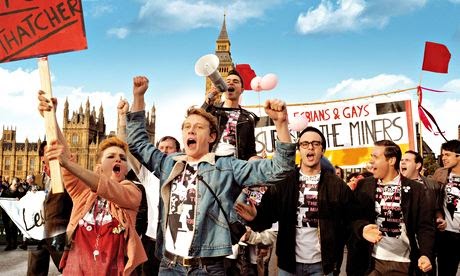A miner work
The mid-80s miners’ strike has already
become British movie shorthand for a particular romanticised view of working-class
struggles. As governments change, and the economic situation moves further and
further from those days of nationalised industries and union dominance, it’s
now reached the status of noble last skirmish in a class war long since
crushed under the furry Ugg boot of capitalism.
Based on a true story (aren’t they all), Pride is the latest in a line of
UK comedies-with-political-overtones, a curiously British phenomenon
which, if done well, results in Full Monty-style feelgood warmth. Conversely,
failure to marry the humour and the darker stuff ends up in more uneven Brassed
Off territory. Pride veers slightly more towards the latter.
The setup is dealt with zippily – a group
of young politically aware gays and lesbians decide during a march to
raise money for the striking miners, a group now victims of even greater
persecution than themselves. Rebuffed by the unions, they decide to offer
their fundraising services to any random mining town who will have them.
Fortunately, they find a Welsh village populated by lovable British character
actors, and away they go. Reasonable levels of hilarity, and some struggles,
duly follow.
The main drawback here is that too many
characters are introduced for them all to be given much in the way of emotional
depth. Luckily, the cast includes actors of the calibre of Paddy Considine,
Imelda Staunton and Bill Nighy who are skilled enough to paper over many of
these cracks. The village is portrayed as a true community of the sort now
mourned to excess, its inhabitants warm, wise and far more open-minded than
perhaps the Welsh Valleys really were in the 80s. Whether the real matriarchs of
isolated mining communities would be this happy to plunge headlong into
London’s pulsating LGBT scene is a moot point.
Indeed, only one family of antagonists
provides any sort of dissenting view, with conflict instead coming from without
– be that the police, the government, or the families of the activists
themselves. The character arc of George MacKay’s Joe provides something of an
anchor for the film. As a young gay man who joins the group by accident, MacKay,
looking like a cross between Rupert Grint and Eddie Redmayne, gives a winning,
breakthrough performance as a young boy (20, but still underage in this era) making
his first tentative steps at living life as an out gay man whilst trying to hide
his true identity from his family.
The other gay and lesbian characters don’t
really go much further than sketches, with the likes of This Is England’s Joe
Gilgun being given nowhere near enough to do. Many of the script’s gags are of
the gay-people-as-amorphous-blob variety, ie the villagers referring to them en
masse as ‘the gays’ or ‘the lezzas’, which fortunately nobody seems to mind. Although
there are some decent lines and warmly funny character moments, from Bill Nighy
in particular (playing closer to his actual age than usual, which in some ways
is quite a shock), the humour just didn’t click for me in the same way as a
Full Monty or a Billy Elliot. And typically all the best gags were ruined by
their inclusion in the trailer.
Pride is nonetheless a well assembled film,
warm-hearted and rose-tinted, dabbling with the political but never getting too
heavy. One or two set-pieces (eg the village pub bursting into song) feel
somewhat overly-calculated but nothing is completely egregious. It works best
as an elegy for working-class solidarity and a lost sense of community, albeit
one featuring Detective McNulty teaching butch miners how to dance and Imelda
Staunton brandishing a huge dildo. Only in Britain.




Comments